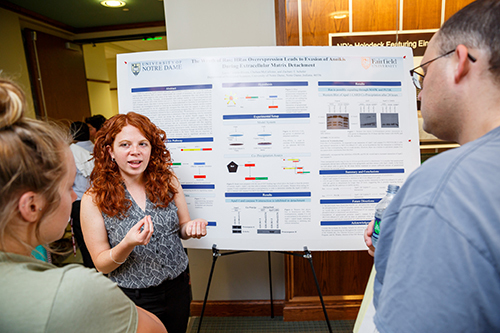 Layra Cintron presents her research.
Layra Cintron presents her research.
This summer, the University of Notre Dame welcomed 14 students to campus to participate in the NSF-funded Research Experience for Undergraduates (REU) program in the Department of Biological Sciences.
The program’s director, Michelle Whaley, described the biology REU hosted by Notre Dame as “a rigorous, but supportive, summer program with strong mentorship.” It aims to involve undergraduates in ongoing research projects in a meaningful way, offering them the opportunity to conduct research with Notre Dame faculty. Through the program’s weekly seminars, students acquire science communication skills, particularly in writing research proposals. They also attend regular group meetings in their research labs and special workshops on career paths in the sciences, integrative research, ethics, and scientific communication. Then, at the end of the program, students give formal presentations of their research projects at the Biological Sciences Undergraduate Research Symposium.
This year, each student applied for one of 16 projects, each one focusing on an aspect of integrative cell and molecular biology ranging from early tumor development to kidney regeneration in zebrafish. At the symposium, the students enthusiastically presented their work to other students, friends, and family. One student, Dallece Curley, studied circadian rhythms in Anopheles gambiae mosquitoes in the lab of Mary Ann McDowell, an associate professor of biological sciences. Curley, a rising sophomore at Virginia Tech, explained that this species of mosquito has developed resistance to some existing insecticides, leading to increased malaria transmission. She studied the genomes that exhibit differences in the circadian behavior, physiological responses, and resistance to insecticides in sub-species of the gambiae mosquito. “A better understanding of insecticide resistance and temporal behavior, such as blood feeding, could lead to the creation of new insecticides and the reduction of malaria transmittance,” she said.
Layra Cintron spoke keenly about the research she conducted in cancer biology under the guidance of Zachary Schafer, the Coleman Foundation Associate Professor of Cancer Biology. Specifically, Cintron studied how oncogenes permit detached cells to survive and metastasize. A rising junior biology major at Fairfield University who intends to go to graduate school, Cintron commented that the program gave her not only the opportunity to conduct research, but also a taste of “the graduate school experience.”
Describing what she calls the “unique vibrancy” of the program, Whaley said, “Every year a cohort forms and students make lasting connections with each other and with their mentors.” This is certainly true of Felicity Newton, a former Notre Dame biology REU participant and now a first-year Ph.D. student at Notre Dame. Newton’s doctoral work builds upon the research she began with associate professor Kevin Vaughan in the summer of 2015. Prior to the REU program, Newton said she was a biochemistry and molecular biology major with no research experience. She said that the REU program helped her to narrow her interests to the study of proteins and cell imaging and taught her “how to research intelligently.”
The biology REU is open to current freshmen and rising sophomore and junior undergraduates at four-year colleges who are majoring in biological sciences and aspire to have a career in research.
Learn more about the REU program in the Department of Biological Sciences.
Originally published by Chontel Syfox at science.nd.edu on September 27, 2016.